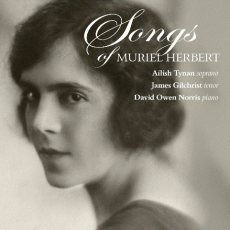Songs of Muriel Herbert - International Record Review
To my shame I do not remember hearing any songs by Muriel Herbert (1897 - 1984), but it is perhaps the shame of others that they have been neglected. This CD from Linn, consisting of 36 of her compositions, makes some amends. The note by Claire Tomalin, the composer's daughter, provides the background of someone who was an accomplished pianist but preferred writing music to playing it. She won a scholarship to the Royal College of Music in 1917, studying under Stanford.
The songs are very much of their time and mostly on the slow side. They should appeal to anyone who likes, for instance, the songs of Quilter, for whom Herbert formed amorous intentions, causing him to beat a retreat. As Tomalin points out, many of the songs are melancholic, like James Joyce's She weeps over Rahoon, prettily but sadly set, and few indeed are spirited or exuberant. Jenny kiss'd me, lasting only 54 seconds, has a friskiness, and Tewkesbury Road, to words by Masefield, has a bold tune which helps to create the open-air feeling of the English countryside. Only one, Renouncement, exceeds three minutes' duration, and that by just four seconds. None of the six songs for children, Merry-go-round, reaches one minute.
Some poems have been set by others, like Joyce's I hear an army charging (Barber) and Housman's Loveliest of Trees (Butterworth). Other poets set by Herbert include Hardy, Herrick, Meredith, Swinburne and Yeats, the last with an attractive The Lake Isle of Innisfree, Herbert's ability as a pianist was probably the reason why some of the accompaniments are quite involved, such as the rippling one for Love's Secret.
The distribution of the songs is far from equal. Why does James Gilchrist perform 24 to Ailish Tynan's 12? Some have words which suggest the need for a male singer, Hardy's Faint Heart in a Railway Train being an example, while others are for a woman (She weeps over Rahoon), but many can fall to either sex.
Gilchrist introduces variety to his singing, tempering it to suit the words or the overall picture, so Tewkesbury Road is delivered in louder, more expansive voice than, say, When Death to either shall come. To this Robert Bridges poem he brings just the right weight, with some soft tones that are en rapport with the sad words. In fact, he is well suited to the quieter songs. He does have weak bottom notes, as in the opening line of I dare not ask a kiss, and he exaggerates the letter ‘r', to the music's detriment. His enunciation is clear, so he does not need to overstress, as Ailish Tynan known and thus sings the ‘r' naturally. Her tones do not have as many shades as Gilchrist's, but she sings sweetly, with the children's songs providing good examples. David Owen Norris is more than capable, or course, in his pianistic andeavours, no matter how intricate the accompaniment is.
The recorded sound is slightly hard on the ears, especially when the tenor sings loudly, but is clear. These songs by Muriel Herbert may not match the best of her contemporaries Warlock and Finzi but they do not deserve neglect. Will this CD entice anybody to sing some in public?

